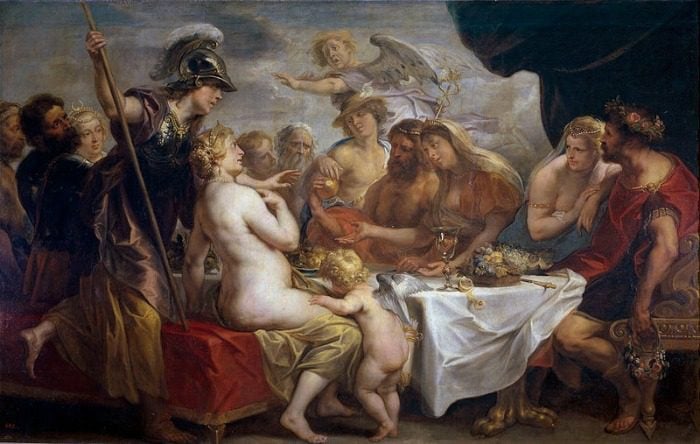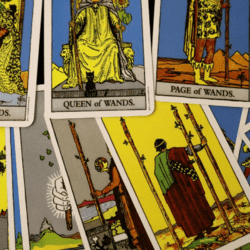“For many are called, but few are chosen.”
~ Matthew 22:14, KJV
Author’s note: The following was prompted by the Patheos article, The Toxic Narrative of “Being Chosen” by Gods and Bad Boys. I thought it might be helpful to explore this idea a bit further and look at what some of us mean by this idea of being “chosen” by a deity, and perhaps present an alternative viewpoint to this phenomenon.

There are many examples from literature of the type of being “chosen” as interpreted in the article linked above, especially if we look to stories from the Judaeo-Christian scriptures (3 days and nights in the belly of a fish, I mean, how manipulative is that?) and so I agree that casting the act of being chosen by some deity as something to which we have no say in the matter is toxic, and those who think this fate has befallen them probably need to examine why they feel their lives suck so bad that they require to be the hapless victims of some bully gods in the first place. Then again it could also be a way to validate certain beliefs that may not have a firm foundation in reality – we have been chosen by this god, this god must therefore really exist.
While I do agree with the sentiments expressed in the article as far as it goes, the argument here can also sometimes be broken down to a question of semantics. Things are rarely so simplistic as depicted in either/or scenarios; not often is life so clearly black and white. This is one reason I don’t think we can dismiss out of hand the entire concept of being divinely chosen as if it were altogether a bad thing. I understand that there are those who might be fulfilling a psychological need by feeling they have been forcefully compelled into the service of some god. If that is not the case however, perhaps a healthier way to express this would simply be to say we have been “called” rather than using a loaded term like “chosen”. Being called implies we have not relinquished free will but retain the choice whether to answer the call or ignore it, and also implies that we might have something to gain personally from the relationship rather than it being just unidirectional or parasitic.
The feeling that our god has chosen us might well be a valid one, but it is also true that in any relationship it is always our own choice whether to accept being chosen or not. I chose my husband, but he also chose me; it was a choice made by mutual consent based on mutual love and respect. I choose to do the work given to me by my employers, and I reap the benefits of getting paid for it. My employers on the other hand have chosen me to do the jobs they want done based on my abilities and past experience. There are types of being chosen (to represent one’s country in the Olympics, say, based on performance skills) that have nothing to do with those in the toxic category.
For instance consider the relationships we have with our spiritual totems. It is often said that we do not choose our totems but that our totems (be they animal, vegetable, or mineral) choose us, and this has been my unvarying experience with totems as well. It is not the same as being “chosen” by a bad boy (or girl) god/dess to do their unquestioned bidding, gods forbid (remember that dreadful Abraham and Isaac story). On the other hand totemic relationships are always potentially beneficial, and other than our lifetime totems, these relationships can come and go as the need arises for a particular totem’s particular message to be applied in our lives. Sometimes these are warnings or portents, sometimes a message to us that adopting the aspects of a certain totem will be helpful in dealing with whatever life happens to be throwing at us at the moment. That is, if we are wise enough to hear the message.
My personal thinking is that ultimately these things originate in our psyches, but I’ve always stood by the axiom that a difference that makes no difference is no difference, so what the hell. I won’t argue here about whether or not gods or totems are really “real” because if we heed what they are telling us the outcome of their appearance is the same no matter what we believe to be their origins (hedgewitching 101 – the late author Terry Pratchett called it “headology”). I think the point is that we not forget that in any relationship the choice to be there always lies with us. Being chosen is ultimately our own choice, every blessed one of “God’s Chosen People” out there notwithstanding.
I’d like to note that Persephone, one of the goddesses I most admire, was “chosen” by the god Hades in just such a manner as presented in the above linked article. Another term widely used for this particular instance is “rape”. I have felt a personal desire to explore the Mysteries of Persephone, and I consider this a great honour. Persephone, working within the culture from which she emerged, turned her abduction into a personal victory and became not only the Goddess of Spring, but also the Goddess and Queen of all the Underworld. Unlike Persephone however, I have never felt any overpowering compulsion to venerate or follow this god, or else (She of all people wouldn’t do this anyway). If I open my mind to Her aspects and meditate on Her stories, then I understand it is to my benefit to experience the wonders and insights that such attention offers me. If I choose not to do so, the only punishment that follows is that I miss out on gaining what might prove to be life-affirming enlightenment. At no time have I felt that becoming fish food was a prerequisite to this enlightenment however.
If we suddenly feel an affinity towards a god that we’ve never given much previous thought to, then by all means we may heed that call if we deem this to be beneficial to us. If not, then that god or that guy or that job can buzz right off and go choose someone else. Either way, the choice is ever and always ours and ours alone. I believe it is good for us to question our gods; any god worthy of respect would never make us into his or her slave. A wise man, Henry David Thoreau, once wrote, “God could not be unkind to me if he should try.” In other words, a god deserving of our honour will honour us and our autonomy in return; any other response would be impossible for such a god.

















